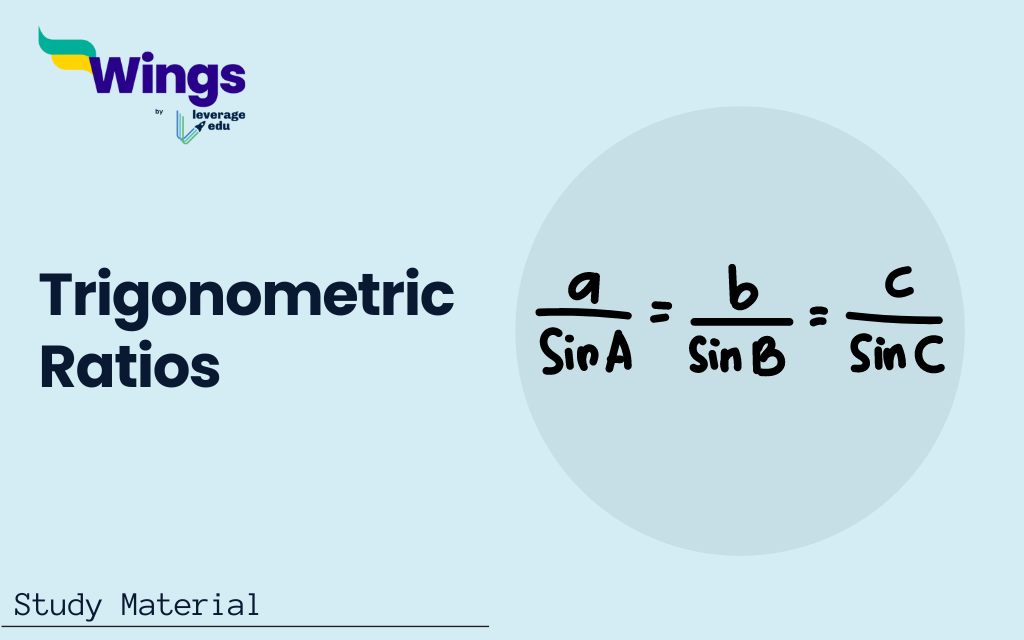A triangle has three sides: hypotenuse, adjacent, and opposite. The ratio between these sides based on their angle is known as the trigonometric ratio.There are six trigonometric ratios: sine (sin), cosine (cos), tangent (tan), cotangent (cot), cosecant (cosec), and secant. Trigonometry, a field of mathematics, studies the relationships between the sides and angles of right-angled triangles. As a result, the sides and angles are used to calculate trigonometric ratios.The trigonometry ratios for a specific angle ‘θ’ are mentioned:
| Trigonometric Ratios | |
| Sin θ | Opposite Side to θ/Hypotenuse |
| Cos θ | Adjacent Side to θ/Hypotenuse |
| Tan θ | Opposite Side/Adjacent Side & Sin θ/Cos θ |
| Cot θ | Adjacent Side/Opposite Side & 1/tan θ |
| Sec θ | Hypotenuse/Adjacent Side & 1/cos θ |
| Cosec θ | Hypotenuse/Opposite Side & 1/sin θ |
Contents
What are Trigonometric Ratios?
Trigonometry has six trigonometric ratios: sine, cosine, tangent, secant, cosecant, and cotangent. These ratios are abbreviated as sin, cos, tan, sec, cosec, and cot. Let’s look at the right-angled triangle depicted below. Trigonometric ratios can be used to calculate the ratios of any two sides of a right-angled triangle in terms of their angles.
Trigonometric ratios can be computed by measuring an acute angle (θ) in the right-angled triangle shown below. This indicates that the angle C determines the value of the ratio between any two sides of the triangle. We may also find the values of these trigonometric ratios for angle A. In addition, just the base and perpendicular of the given right triangle will change in such situation.
Also Read: Area Of Isosceles Triangle with Solved Example
How to Find Trigonometric Ratios?
Consider a right-angled triangle with B as its right angle.
Trigonometry ratios are expressed in relation to ∠C as follows:
Sine: The sine of an angle is defined as the ratio of the side opposite (perpendicular to the angle) to the hypotenuse. In the above triangle, the sine of angle θ can be given as, sin θ = AB/AC.
Cosine: The cosine of an angle is defined as the ratio of the side adjacent to it to the hypotenuse. Here, the cosine of angle θ can be given as, cos θ = BC/AC.
Tangent: The tangent of an angle is defined as the ratio of the side opposite to the angle to the side adjacent to it. Here, the tangent of angle θ can be given as, tan θ = AB/BC.
Cosecant: The multiplicative inverse of sine. Here, the cosecant of angle θ can be given as, cosec θ = AC/AB.
Secant: The multiplicative inverse of cosine. Here, the secant of angle θ can be given as, sec θ = AC/BC.
Cotangent: The multiplicative inverse of tangent. Here, the cotangent of angle θ can be given as, cot θ = BC/AB.
Trigonometric Ratios Table
The trigonometric ratios for some specific angles, such as 0°, 30°, 45°, 60°, and 90°, are listed below and are frequently employed in mathematical calculations.
| Angle | 0° | 30° | 45° | 60° | 90° |
| Sin C | 0 | 1/2 | 1/√2 | √3/2 | 1 |
| Cos C | 1 | √3/2 | 1/√2 | 1/2 | 0 |
| Tan C | 0 | 1/√3 | 1 | √3 | ∞ |
| Cot C | ∞ | √3 | 1 | 1/√3 | 0 |
| Sec C | 1 | 2/√3 | √2 | 2 | ∞ |
| Cosec C | ∞ | 2 | √2 | 2/√3 | 1 |
Solved Examples
- Find tan θ, sin θ, and cos θ for a right-angled triangle ABC with hypotenuse AC = 5cm, base BC = 3cm, and perpendicular AB = 4cm, where ∠ACB = θ.
Solution,
Given,
In ∆ABC,
Hypotenuse, AC = 5cm
Base, BC = 3cm
Perpendicular, AB = 4cm
Then,
tan θ = Perpendicular/Base = 4/3
Sin θ = Perpendicular/Hypotenuse = AB/AC = ⅘
Cos θ = Base/Hypotenuse = BC/AC = ⅗
- Find the value of tan θ if sin θ = 12/5 and cos θ = ⅗.
Solution,
Given, sin θ = 12/5 and cos θ = ⅗
As we know,
Tan θ = Sin θ/Cos θ
Tan θ = (12/5) / (⅗)
Tan θ = 12/3
Tan θ = 4
Related Posts
FAQs
The three trigonometric ratios are sine (sin), cosine (cos), and tangent (tan).
Tangent functions are equivalent to the ratio between sine and cosine functions.
Tan θ = Sin θ/Cos θ.
Trigonometric ratios are used in a variety of real-world applications, including:
1. Sin and cos functions are used to depict a variety of wave and harmonic functions.
2. Trigonometric ratios are employed in the study of architecture, civil engineering, astronomy, and other subjects.
3. Trigonometric ratios are used to determine directions and create maps.
This was all about the “Trigonometric Ratios”. For more such informative blogs, check out our Maths Section, or you can learn more about us by visiting our Study Material Section page.


 One app for all your study abroad needs
One app for all your study abroad needs












 60,000+ students trusted us with their dreams. Take the first step today!
60,000+ students trusted us with their dreams. Take the first step today!